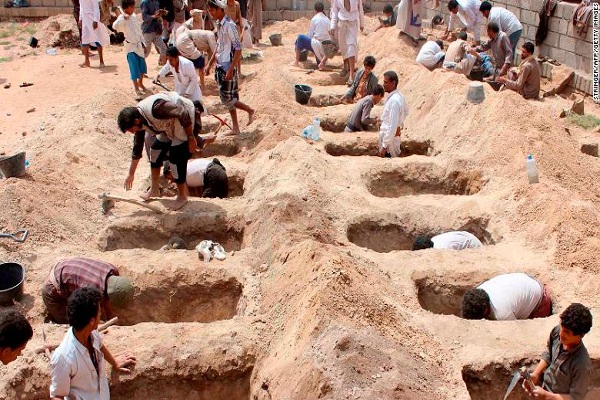Saudi-Led Coalition Denies War Crimes, Says Bus Legitimate Target

His remarks followed a statement from Human Rights Watch on Sunday that called the attack an "apparent war crime."
The bus attacked on August 9 was "a legitimate target," Colonel Turki al-Maliki, the spokesman for the Saudi-led coalition in Yemen, said in an interview with CNN.
He claimed that intelligence information showed that the bus was "not a school bus because there is no school at that time when the incident happened."
"We never observed any kids on the bus," al-Maliki said, adding the "coalition conducted the attack against Houthi commanders and some Houthi element fighters in that bus."
Al-Maliki also cast doubt on video footage and pictures from the scene of airstrike, because the source of such evidence is unclear.
"Is it by the Houthi? Or what's the source for that picture and videos?" he asked.
Dozens of people, including schoolchildren, were killed in the attack, according to HRW and the Houthi-held Health Ministry.
Mansour Ahmed al-Mansour, spokesman for the coalition's investigative body, the Joint Incidents Assessment Team (JIAT), said in Riyadh on Saturday the bus was a "military target," a statement al-Maliki echoed.
In the interview Sunday, al-Maliki repeatedly pointed to the findings of the JIAT, which on Saturday admitted "mistakes" were made. Al-Maliki said the coalition accepts the JIAT findings.

The attack was later revealed by CNN to have been carried out using an American-made bomb that had been sold to Saudi Arabia, raising questions about whether the United States bears any moral culpability.
The "Saudi-led coalition's attack on a bus full of young boys adds to its already gruesome track record of killing civilians at weddings, funerals, hospitals, and schools in Yemen," Bill Van Esveld, HRW's senior children's rights researcher, said in a statement Sunday.
"Countries with knowledge of this record that are supplying more bombs to the Saudis will be complicit in future deadly attacks on civilians," Van Esveld added.
The rights group, which said it interviewed witnesses and reviewed videos and photos of the scene, identified 34 people, including 26 children and 4 teachers, who were killed in the August 9 attack. A Houthi government official in Yemen has said 51 people, including 40 children, were killed in the attack.
The children, reportedly aged six to 11, had been on a much-anticipated field trip marking their graduation from summer school.
Among those HRW interviewed was a 13-year-old boy who was on the bus at the time and feared his injured leg would need to be amputated. Many of his friends were killed in the attack and he said that "Even if I am able to run and play in the future, I will not find anyone to play with."
A CNN investigation revealed that the explosive used was an American-made, 500-pound (227-kilogram), laser-guided MK 82 bomb. The bomb had been sold to Saudi Arabia as part of a State Department-sanctioned arms deal.
The weapon is similar to one that killed 155 people in an October 2016 attack on a funeral hall in Yemen.
In the aftermath of the funeral hall attack, former US President Barack Obama banned the sale of precision-guided military technology to Saudi Arabia over "human rights concerns."
The ban was overturned by the Trump administration's then-Secretary of State Rex Tillerson in March 2017.
'Mistakes' were made
The Saudi Joint Forces Command acknowledged "mistakes" were made in the attack, the Saudi Press Agency said Saturday. It added that it would "undertake legal proceedings to hold the ones who committed mistakes accountable."
Mansour Ahmed al-Mansour, spokesman of the Joint Incidents Assessment Team, speaking in Riyadh on Saturday, said: "There was an obvious delay in equipping the fighter jet at the right place and at the right time, which caused missing the opportunity to target the bus -- which was a military target -- in a clear and open area, to avoid such collateral damages."
The US welcomed the coalition's report on Saturday, with the State Department saying the report is an "important first step toward full transparency" and re-affirming the need for "all sides to abide by the Law of Armed Conflict, to mitigate harm to civilians and civilian infrastructure."
But one former senior National Security Council official from the Obama era was more skeptical, telling CNN: "The Trump Administration seems desperate to find something to praise in the Saudi/United Arab Emirates conduct of this awful war in Yemen."
"The Pentagon may think that celebrating this admission of guilt will encourage genuine Saudi improvement, but if there's any lesson to be learned from over three years of Saudi/UAE bombardment of Yemen, it's that the only thing that really gets the Saudis or Emiratis to change their behavior is tough public US pressure," added the former official.
"The Saudi/UAE coalition needs to do far more to demonstrate an actual commitment to protecting civilians before they deserve the benefit of the doubt," the former official said.



